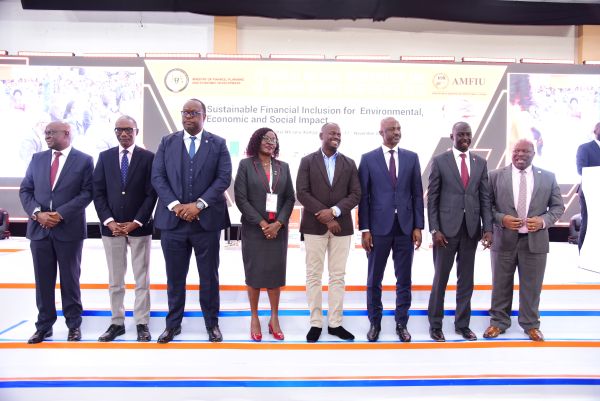KAMPALA, November 12, 2025 — Hundreds of Uganda’s financial leaders gathered at Hotel Africana in Kampala for the Third Annual National Microfinance and Savings Groups Conference, held from November 10-11, 2025, with the conference discussions focused on digitisation, partnerships, and ESG integration as key drivers for deepening financial inclusion across the country.
Key speakers included Ramathan Ggoobi, Finance ministry’s Permanent Secretary and Secretary to the Treasury [PSST], and Haruna Kyeyune Kasolo, Minister of State for Microfinance.
Speaking at the conference, Kasolo highlighted that more than Shs 11 trillion has been invested in various programmes such as the Parish Development Model [PDM], with women representing nearly 60 percent of financially included citizens.
Also, discussions at the event also touched on the importance of tailored financial solutions for marginalised groups, including refugees and persons with disabilities.
On his part, Ggoobi urged stakeholders to embrace the digitalisation and formalisation of savings groups in line with modern financial practices.
“Digitise and formalise community-based savings and credit groups, rather than keeping money in small boxes,” he said.
He also emphasised the need for practical financial literacy training, noting that “theoretical lessons must give way to practical skills so that the public can better understand financial products.”
According to Jacqueline Mbabazi, Executive Director of the Association of Microfinance Institutions of Uganda [AMFIU], by June 2025, the country’s microfinance institutions had disbursed over UGX 3.5 trillion to 1.5 million clients, with 51 percent women and 57 percent rural borrowers.
“Microfinance remains the bridge to Uganda’s grassroots economy,” she said. “Our institutions are closest to smallholder farmers, women, persons with disabilities, and rural enterprises, but raising affordable capital remains our greatest challenge. Access to finance equals access to opportunity.”
On his part, Stephen Bongonzya, Vice Chairperson of the Uganda Cooperative Savings and Credit Union [UCSCU], called for harmonised regulation in the microfinance sector to promote stability.
“There is ongoing contention within the sector,” he noted, urging for clearer frameworks and coordination among regulators.
The conference, held under the theme “Sustainable Financial Inclusion for Environmental, Economic and Social Impact,” sought to promote innovative microfinance models and strengthen policy alignment that integrates environmental sustainability and climate resilience, ensuring financial services contribute to green economic transformation and social equity.
Dr Andrew Obara, Managing Director of Friends Consult and Chairperson of the Microfinance Forum, highlighted the challenges facing the sector: “The private sector often creates financial products without consulting low-income people, resulting in poorly structured and overpriced offerings,” he said.
He added that digital interest costs remain a major barrier to financial inclusion, citing strategic contradictions between government, private sector, and other stakeholders.
Dr Obara further announced that the Microfinance Forum aims to establish a central repository for research, training, and information dissemination to strengthen sector-wide knowledge sharing.
For his part, Mumba Kalifungwa, Chief Executive of Stanbic Bank Uganda, reaffirmed the bank’s commitment to expanding access and resilience through collaboration with microfinance institutions.
“We are mobilising resources, building capacity, and forming partnerships that expand access, create jobs, enhance enterprise readiness, support climate adaptation, and strengthen community resilience,” he said.
“Financial inclusion is a strategic responsibility that must translate into empowerment, productivity, and long-term prosperity, especially for women, youth, and farmers.”
The first day of the conference centred on advancing the National Financial Inclusion Strategy, which aims to achieve 85 percent inclusion by 2028, with a shift from basic access to sustainable inclusion that delivers environmental, economic, and social impact.
Participants agreed on the need to rethink the role of microfinance and savings groups, positioning them not only as financial tools but also as vehicles for climate adaptation, inclusive growth, and social transformation.
Moses Kaggwa from the Ministry of Finance presented Uganda’s Tenfold Growth Strategy, which seeks to expand the economy form the current US$ 500 million to US$500 billion by 2040.
He stressed that financial inclusion is vital for economic transformation as it broadens access to affordable credit and savings, reduces poverty through formal safety nets, and enhances capital formation and resource mobilisation.
The conference was organised by AMFIU in partnership with other stakeholders in the microfinance sector.
https://thecooperator.news/sustainable-finance-curriculum-to-be-launched-in-kampala-on-tuesday/
Buy your copy of thecooperator magazine from one of our country-wide vending points or an e-copy on emag.thecooperator.news
